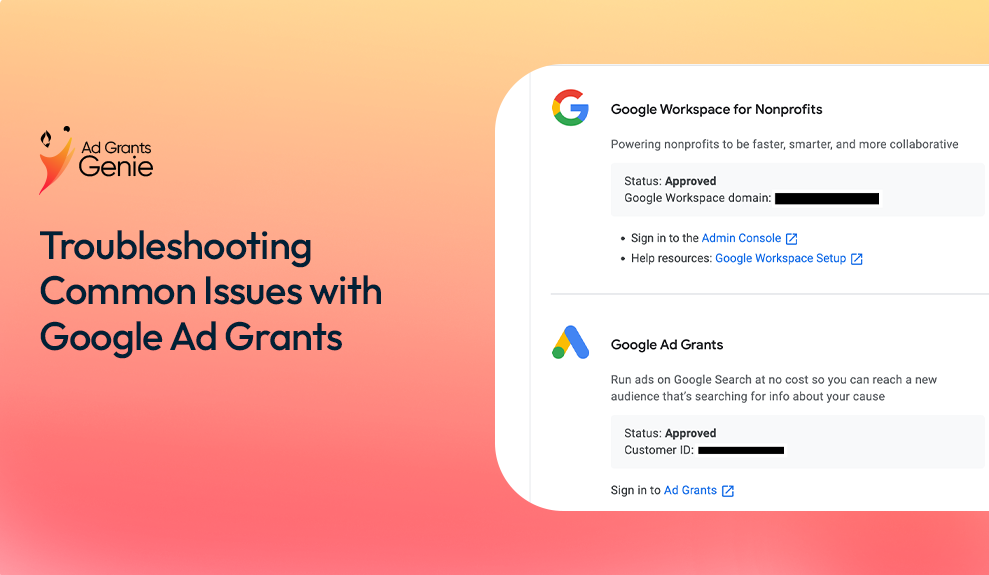If you’re managing a nonprofit, Google Ad Grants can be a game-changer. It gives you up to $10,000 per month in free advertising, helping you reach new donors, volunteers, or advocates. But with great power comes… technical challenges. Running a Google Ad Grants campaign isn’t always smooth sailing, and understanding how to troubleshoot common issues can save you a lot of time and frustration. Let’s dive in!
Why Troubleshooting Your Google Ad Grant Account Matters
Google Ad Grants can drive incredible results, but even small errors can hinder performance. From low click-through rates (CTR) to account suspensions, these issues can leave nonprofits scratching their heads. Understanding how to troubleshoot ensures you’re maximizing this invaluable resource while staying compliant with Google’s policies.
Most Common Google Ad Grant Issues
1. Low CTR and Poor Ad Performance
One of the most frequent problems nonprofits face is fixing low CTR in Ad Grants. Google requires a minimum CTR of 5%, which can be challenging if your ads or keywords aren’t well-optimized. Low performance might also stem from irrelevant targeting or poorly written ad copy.
2. Account Suspension Causes
Account suspensions are a dreaded reality for many nonprofits. Causes often include:
- Policy violations
- Poor performance metrics
- Mismanagement of account settings
Suspended accounts can halt your campaigns, but they’re usually fixable with the right approach.
3. Disapproved Ads
Ad disapprovals often occur due to policy violations. Addressing disapproved ads in nonprofit campaigns involves reviewing Google’s ad policies and updating your copy or targeting.
How to Resolve Account Suspension Issues
Step 1: Understand the Suspension
Google usually provides reasons for suspensions. It could be for policy violations, inactivity, or poor performance. A common Google Ad Grant troubleshooting guide will suggest reviewing suspension emails and ensuring all policies are met.
Step 2: Submit an Appeal
Once you’ve fixed the issue, submit an appeal through your Google Ads account. Be thorough in explaining the corrective steps you’ve taken.
Step 3: Stay Compliant
To prevent future suspensions, maintain compliance by regularly monitoring performance metrics and staying updated on policy changes.
Fixing Disapproved Ads
Disapproved ads can be frustrating, but they’re not the end of the road. Here’s how to resolve ad disapprovals in Google Ad Grants:
- Check the Reason: Google provides specific reasons for disapprovals. Look for notifications in your account.
- Edit the Ad: Whether it’s an issue with phrasing, prohibited content, or a broken URL, fix it immediately.
- Resubmit: After making corrections, resubmit the ad for approval.
Pro Tip: Always double-check your ad copy and landing page before submitting. Nonprofits often face challenges with compliance, especially if their messaging seems too commercial.
Ad Copy Compliance
Google’s strict policies often catch nonprofits off guard. Ensure your ads:
- Highlight the nonprofit’s mission clearly
- Avoid overly promotional language
- Include high-quality landing pages relevant to the ad
Nonprofits can also face issues with low ad relevance. Solutions for low ad relevance include targeting high-intent keywords and crafting audience-specific ad copy.
Targeting and Keyword Issues
Targeting the wrong audience is a common mistake. If you’re experiencing poor performance, refine your keywords and demographics. Use tools like Google Keyword Planner to identify terms your audience searches for.
Also, avoid overuse of short-tail keywords. For example, instead of “donate,” target specific phrases like “donate to animal shelters” to improve precision and relevance.
Handling Low-Performance Metrics
Low-performance metrics are a red flag in Google Ad Grants. Troubleshooting low performance with Google Ad Grants often involves analyzing your data:
- CTR: If your CTR is below 5%, try A/B testing different ad headlines or descriptions.
- Conversion Rate: Are users landing on your page but not taking action? Improve your call-to-action (CTA) and landing page experience.
- Keyword Quality: Focus on keywords with high search volume but low competition.
Improving Ad Relevance
Ad relevance plays a big role in performance. Common Google Ad Grant challenges include mismatched ad copy and keywords. To fix this:
- Ensure your ads match the user’s intent.
- Regularly update your keyword list.
- Use ad extensions to provide extra information.
Optimizing Landing Pages
Even with great ads, a poor landing page can ruin your campaign. Ensure your landing pages:
- Load quickly
- Are mobile-friendly
- Clearly align with your ad’s message
For instance, if your ad promotes volunteer sign-ups, the landing page should prominently display a sign-up form and additional information about the opportunity.
When to Contact Google Support
Sometimes, troubleshooting Google Ads isn’t enough. If you’ve tried everything and still face issues, reach out to Google Support. They can provide personalized solutions for PPC problems and guide you on resolving policy violations in Google Ads.
Tools to Streamline Troubleshooting
Navigating Google Ad Grants can be overwhelming, especially when you’re juggling ad approvals, performance metrics, and compliance issues. Fortunately, there are several tools designed to simplify the process and make troubleshooting more efficient. Here’s a closer look at some must-have tools and how they can help your nonprofit:
1. Google Ads Editor
Google Ads Editor is a downloadable application that allows you to manage your campaigns offline. It’s especially useful for bulk edits and identifying common errors quickly.
Key Features:
- Bulk Edits: If you need to update multiple ads or keywords at once, Ads Editor saves time by letting you apply changes across campaigns in seconds.
- Error Identification: The tool flags issues like missing URLs or policy violations, allowing you to address them before uploading changes.
- Offline Work: Edit campaigns without needing an internet connection, then upload changes when you’re ready.
How It Helps with Troubleshooting:
By identifying errors before they go live, Google Ads Editor helps you maintain compliance and avoid common ad grant errors.
2. Google Analytics
Google Analytics is indispensable for tracking user behavior and understanding how people interact with your ads and landing pages.
Key Features:
- Behavior Tracking: See how users navigate your website after clicking on an ad. Are they staying or bouncing?
- Conversion Insights: Understand which ads drive sign-ups, donations, or other desired actions.
- Audience Analysis: Learn more about your audience, such as their demographics and interests, to refine targeting.
How It Helps with Troubleshooting:
If you’re experiencing low performance, Analytics can help pinpoint the issue. For example, if users are bouncing from your landing page, it might be a sign that the page isn’t user-friendly or doesn’t align with the ad’s promise.
3. SEMrush
SEMrush is a powerful tool for keyword research, competitive analysis, and performance monitoring.
Key Features:
- Keyword Optimization: Find high-performing keywords tailored to your nonprofit’s goals.
- Competitor Analysis: See what similar organizations are targeting and which keywords work best for them.
- Ad Performance Metrics: Evaluate how your ads stack up against others in your industry.
How It Helps with Troubleshooting:
If your ads aren’t performing well or you’re struggling with low ad relevance, SEMrush can help you refine your keyword strategy and ensure you’re targeting the right audience.
4. Google Support Center
The Google Support Center is your go-to for resolving complex issues that require expert assistance.
Key Features:
- Comprehensive Resources: Access guides, FAQs, and troubleshooting tips specific to Google Ad Grants.
- Direct Support: Contact Google’s support team for personalized help with account suspensions, ad disapprovals, or performance problems.
- Policy Clarifications: Get clarity on Google’s policies to avoid future violations.
How It Helps with Troubleshooting:
When you’ve tried everything and the problem persists, the Google Support Center is the best place to turn. Their team can help you resolve technical issues and provide tailored advice for managing your nonprofit campaigns.
Preventing Future Issues
Avoiding problems altogether is always better than troubleshooting. Here’s how to stay ahead:
- Regular Audits: Perform monthly audits to catch potential issues early.
- Stay Updated: Google frequently updates its policies. Make it a habit to review them.
- Optimize Continuously: A/B test ad copy, update keywords and refine targeting regularly.
Troubleshooting Google Ad Grants might seem daunting, but with the right approach, you can overcome these challenges and maximize your impact. Remember, Ad Grants Genie is here to help you every step of the way. Whether it’s fixing ad errors, resolving policy violations, or improving ad relevance, we’ve got your back.
Ready to transform your Google Ad Grants campaign? Let’s make every click count!





